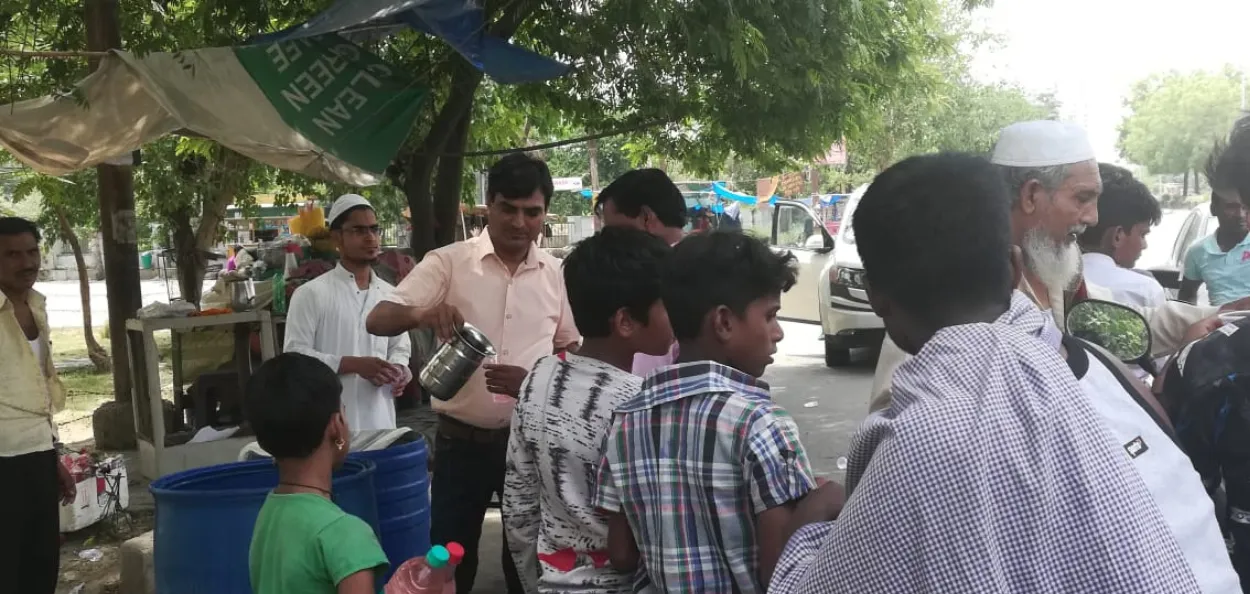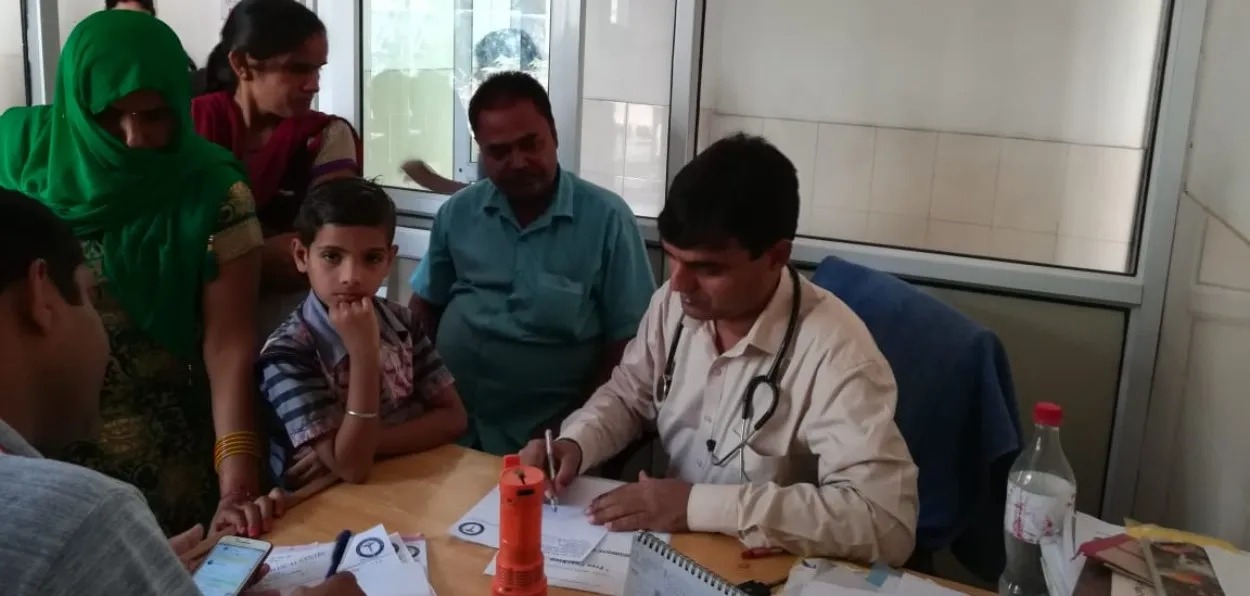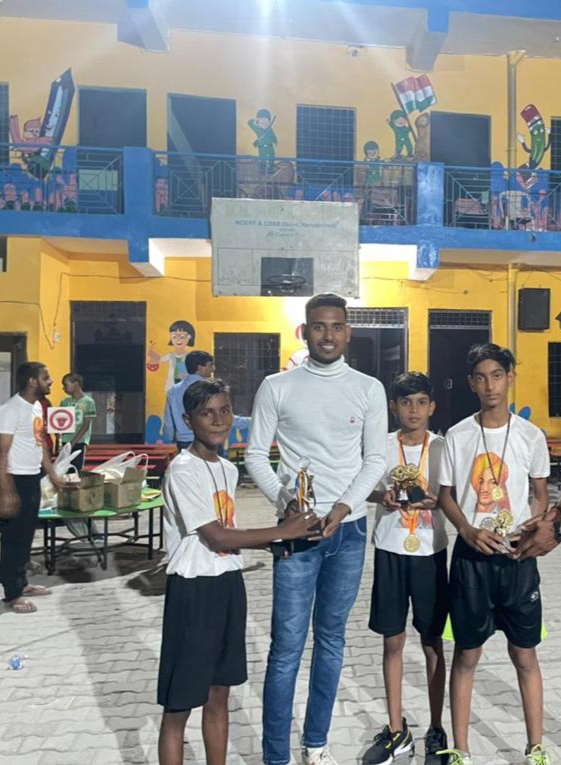Noida, UTTAR PRADESH:

It is not rare to find Muslims doing social work silently, unwilling to promote themselves. One such person is Dr. Sarfarazuddin, a homeopath who lives in sector 105, Noida, Uttar Pradesh.
He has been feeding 100 deprived people every day for the past five years and teaches students free. He brings ill and unknown covid-dead patients home bathes and buries them, all by himself, and even marries off daughters of destitute families.
Dr. Sarfaraz, as he is popularly known, does good work at various levels. He has been feeding one meal (lunch) to 100 deprived daily for the last five years. He made that arrangement in a school he had opened in 2009 for the underprivileged children in a village nearby called Gejha, with his own money.
The school has 20 rooms on two floors. The students, who have lost either of their parents or are orphans, bright and have more siblings, children of domestic helpers, daily wagers, guards, gardeners, sweepers, etc., study free of charge here.
Others pay a nominal fee. Out of a total of 400 students, most are non-Muslims while some 40 of them are from nearby madrasas. He has recently gathered these students of madrasas of Gejha who had no modern education, to his school, taught them the basics of modern education, computer trained them, and brought them to par with students of 8th standard in his MM School (UP Board) so that they can take board exams and choose competitive subjects later; engineering, medicine to administrative.

Additionally, he has also started coaching students who want to play volleyball. It keeps them fit and if some of them play well, he says, they would be sent to state and national level competitions.
These children are both from the madrasas and nearby government schools which have no space or free coaches. 100 such students take coaching in different sessions, most of them, non-Muslim. Dr Sarfaraz distributes food to the underprivileged A beneficiary and volleyball coach,20-year-old Vishal swears by the good work Sarfaraz does.
He says, “My father is a daily wager and mother, a domestic help. I needed money to keep my studies and training going. So I offered to coach the students at his school and he readily agreed. Now I coach 100 students who don’t pay any fee, but I get a good payment from Sarfaraz Sir. I have played at the state and national levels. I would be sponsored by him separately if I could play more.”
He also says that Sarfaraz never charges him for medicines he takes for his mother, siblings, and extended family quite often. Sarfaraz also treats the disadvantaged of the area free of cost at his clinic in Gejha on alternate Saturdays and Sundays. He also gives them free medicines. Additionally, he has been regularly holding medical camps for underprivileged patients. During the Covid and lockdown period, he used to get some 200 to 250. The camp had to be stopped “for lack of funds for a few months”. It is difficult to make this man of few words speak about himself. But with an assurance that it might inspire more people, he got ready to share why and how he wishes to give his “entire life for khidmat-e-khalq” (serving people).
“I was always interested in social service as I used to observe my father, principal of a government school in UP, doing social work passionately. So it is integrated into my system. I started serving alongside my father by shifting my clinic from Bhangel to Gejha.”
On how he manages funds, he says, “I do it despite being in deficit. We get things on credit and clear the older dues and take new ones on credit again. Apart from spending from my pocket, I have a small circle of friends who support me on a regular or irregular basis. Some help comes from unknown sources at times.” Of late, apart from his homoeopathy clinic, he has also been running a small medical centre which takes care of some of the expenses for the good work.
Sarfaraz shares why he multiplied his charity work after he saw migrant labourers walking home barefoot, hungry and sick from Noida Expressway during the lockdown. “It was painful to see them. I bought whatever I saw on the road – the entire the of bananas, other fruits, biscuits, called some maulanas from nearby madrasas, and other people and we all stood on the road to feed these labourers day and night for several days. This made me think that I was still not doing enough for the underprivileged.”
Rajesh Yadav, a beneficiary, vouches for the help he has had from Sarfaraz. He says, “I live in sector 45 which is far from here. During the entire covenant lockdown period, my whole family could survive because he used to distribute food twice daily. I have seen him running behind buses and trucks full of labourers etc., to distribute food. He also offered me to make food for his beneficiaries because I am a halwai (sweet maker) by profession. During covid period and lockdown for two years, all the shutters were down, and only my work was sustained all thanks to him. He also never stopped my payment and helped me financially whenever I asked. He never treats me differently because I am a non-Muslim. Now I understand how political leaders divide us,” he gets emotionally charged.
After having felt that he was doing too little during covid, he alternatively kept on helping deprived families marry off their daughters. He even brought home several patients who died in covid when their families had either refused to take their bodies, were far off or they had no one left in the family. He gave them ghusl (bathed) and buried them in a nearby graveyard with his own hands without ever asking for their names, or contact details or expecting anything in return.
Mohammad Shahid, a transporter by profession, vouches for the work he does. He shares, “I shifted to Noida in 2008. Since then I am witnessing Sarfarazbhai working relentlessly for the poor. In my view, the two biggest things he has done are, bringing the dead from several societies nearby to his home (in case they have no one to perform the last rituals), getting them ghusl, and having them buried with respect. He did it during covid and is still doing it. Also, this deserted area had no graveyard for the Muslims. This was a great problem as other graveyards wouldn’t let us bury our dead due to overcrowding.

Coach Vishal Yadav with students he coaches in Volleyball Dr sahib fought tooth and nail with a known builder who tried capturing the graveyard land for erecting a skyscraper in consonance with some greedy Muslims of the area and finally was able to retain around 2 acres of the graveyard. Dr Sarfaraz has helped the Muslims in and around Noida Expressway a great deal by building the only graveyard. I am also aware of his other charity work and can vouch for the fact that not even established NGOs with tonnes of money, don’t do the kind of work I have seen him doing.”
Sarfaraz’s family, consisting of a spouse and three children, he says, “often get anxious for it keeps him overtly busy, but they keep on supporting. Knowing this will never change, it is becoming a part of their system too,” he smiles. Agrees his wife Shaheen, however, adding that khidmat e khalq has been a part of her upbringing too.
“My father a school teacher who also has a family business of transport would always make sure that at least 20 deprived people ate at our home every day, at AaliGaon near Badapur Delhi, where we lived. I remember all the humble families used to have tea and breakfast at our home daily. After marriage, I found that Dr.Sarfaraz seemed to have gone a step further. Even while we were all suffering from covid, he used to leave home to help those in need in the wee hours of the morning.
She adds laughing, “the excuse he would give us was, I don’t see you guys offering fajr (morning) prayer. It depresses me so I go to the mosque nearby to offer mine.” Shaheen also adds that their children have imbibed this habit naturally.
Her young daughters, Sana and Saba, textile and product designers respectively, have started keeping 2.5 percent separate as zakat from their little earnings or pocket money. She also recalls a recent incident about her son, 14-year-old Asad, who wanted to eat delicious biryani sold every Friday near Gejha mosque.
“He asked for money but he came back empty-handed and hungry. I asked him why he didn’t eat biryani. He replied, as he started from home, two old women asked for some money. He gave them all and came back. He remained hungry to feed them. So, it runs in the family,” she says with a contented smile. Did anyone say, charity begins at home?
source: http://www.awazthevoice.in / Awaz, The Voice / Home> Story / by Rana Siddiqui Zaman / posted by Shaista Fatima / February 17th, 2023








